Summary 
A contemporary modernization in an intimate production with 300 seats in-the-round. Alternating lead actors, plus a tattooed black-sheep Cordelia, Edmund as a Gulf War veteran shooting baskets, Kent in disguise as a cable TV repairman, and a cruel preppie Cornwall are odd but interesting interpretations, and the large scale tragedy has tremendous emotional impact within the small black-box space. Expertly directed and quickly paced.
Design
Directed by Bill Rauch. Scenic design by Christopher Acebo. Costume design by Linda Roethke. Lighting design by Christopher Akerlind. Compositions and sound design by Andre J. Pluess.
Cast
Michael Winters (King Lear), Vilma Silva (Goneril), Robin Goodrin Nordli (Regan), Sofia Jean Gomez (Cordelia), Armando Duran (Kent), Richard Elmore (Gloucester), Raffi Barsoumian (Edmund), Benjamin Pelteson (Edgar), Daisuke Tsuji (Fool), Peter Frechette (Albany), Rex Young (Cornwall), Barzin Akhavan (Oswald).
Analysis
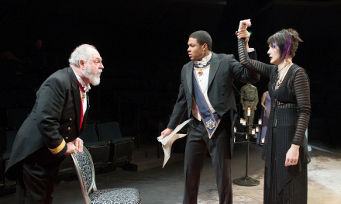
Bill Rauch's production of King Lear at the Oregon Shakespeare Festival's Thomas Theatre is an audacious attempt to re-imagine the epic family tragedy within a modern context and intimate black box confines. Rauch fuels the in-the-round drama with anti-materialism and a strong sense of social criticism. The King's selfish older daughters are just that, self-serving and self-interested, quite far from any embodiment of evil. Cordelia herself is the figurative black sheep, tall and willowy, very goth in her pale skin and short-cropped black hair. The Fool is played by a young Asian actor in sneakers, and the bastard Edmund is a disenchanted Gulf War veteran looking to buck the system as well as his overblown father.
Raffi Barsoumian gives Edmund a soldier's muscular swagger, arriving 1.1 in camouflage fatigues along with boots and beret, dropping his overstuffed duffel bag to move closer to Lear's white spot-lit throne. Other staging is sparse, four candelabra each with ten candles spaced across the playing area, plus a center-stage museum map-case accessible via a scarlet red runner. Barsoumian's middle-eastern Edmund snaps to attention when his father and Kent approach in military officers' uniforms, and he salutes Kent while ignoring his father's crude hip-thrusting joke - "there was good sport at his making" - regarding his mother.
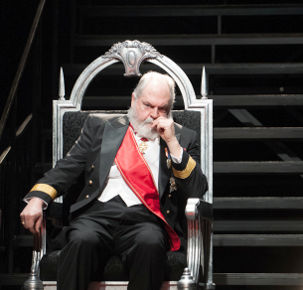
Rauch wisely uses two actors to take on the demanding role of Lear, alternating their performances. The Lear tonight is Michael Winters, playing the King as a weak and petulant old man, enjoying the pomp and ceremony as he descends stage left stairs to his brightly lit throne, a red sash across his chest. Sofia Jean Gomez's memorably anti-authority Cordelia has a purple streak in her jet-black hair and sports a silver crown, ear rings and a chain augmenting a tattoo across her neck. Cordelia (barely) wears a lacy black shirt that reveals a jet-black bra underneath, and she laughs aloud to mock her father's request for daughterly praise. She continues to defy Lear even after he yanks the crown from her head and flings it across the stage, and the court gasps when he rises to disarm Kent - "see better, Lear!" - then threaten him with his own sword. Gomez's Cordelia, defiant though visibly shaken, returns her crown to the table, kisses the old French king in gratitude for his acceptance of her, then sneers at her goody-two-shoes sisters as she struts off.
Barsoumian's Edmund makes a fascinating and believable villain 1.2, bouncing a basketball while wearing an army-issue T-shirt and shooting baskets at a hoop and backboard wheeled to stage left. He makes clever use of the orange basketball, bouncing it off his head in frustration at his "slow" wits, then referring to it as the "planetary influence" in his confessional soliloquy. He even bounces the ball to an audience member in the front row, remarks on "the admirable evasion," and sits with the audience to reveal his plotting. His disrespect seems natural, especially when highlighted against the forced-sounding "toughness" of Gloucester, who kicks the basketball back to his bastard son and struts like a rooster in his power suit, red tie, glasses and goatee - "strange, strange" - or his long-haired brother Edgar, lurching in kind of drunk, wearing a tuxedo and swinging a champagne bottle. Edmund's deceit of the über-entitled Edgar - "this is the excellent foppery of the world" - is executed merely by pretending to conceal a forged letter, then giving his brother a serrated combat knife for his own protection. Edmund exits then, of course, with a basketball lay-up as easy as his deception.
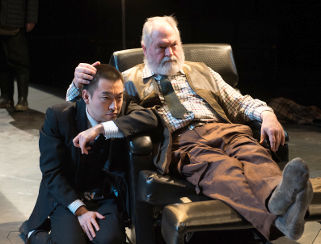
Rauch's modernization of Goneril's home 1.3 is both amusing and an in-vogue criticism of the one percent and their ostentatious lifestyle. The exiled Kent has returned in disguise as - wait for it - a cable television repairman, and he wears a tool belt over coveralls along with protective goggles and orange vest, moving past a leather recliner to fumble with the television remote and flick through the channels on an expansive flat screen monitor. Goneril arrives wearing riding gear - boots and vest and cap - and wields a riding crop, irritated with the sound of her barking hounds because they presage not the arrival of the King and his retinue, but just her retired old father and his hanger-on loser friends. Albany is a serious bible-thumper, blessing everything in sight, and Winters's Lear is overly comfortable and familiar, popping off his boots, grabbing the TV remote and settling into the recliner with a newspaper. One of his men blows an obnoxious duck hunter's call, and a high-pitched almost girlish laugh from deep within the audience draw's everyone's attention to the Fool, seated like a patron watching the show, a young Asian man with flood pants and different colored socks. Once onstage he barks like a lapdog and leaps into Lear's arms, then wears a show program as a hat and uses a duct-tape-for-beard Lear doll to mock the King's poor decision making. After Goneril and her servants ignore Lear - the vested Oswald with such passive-aggressive smarminess that the irked Kent knocks him down - he staggers 1.5 from chest pains and falls to his knees. Kent helps him rise, and the Fool - with a bag of Doritos - folds out a cardboard paper sign to announce the first "Intermission."
Rauch stages Lear's Act 2 rejection by Regan and Cornwall with admirable flair geared toward old-money modern gaudy. First, a looming wrought iron fence is wheeled 2.1 onstage - topped with a cursive "G" for Gloucester - to represent the gated mansion of Gloucester and his sons. An apparent spy in trench coat, hat, and sunglasses speaks furtively with Edmund between the rails, and Edmund drags a knife so graphically across his forearm that the audience audibly gasps, and he explains what he has done before calling for "help." During 2.2 a preppie former frat-boy Cornwall arrives with luggage, wearing a Manchester United soccer club jacket, popping his bubble gum and slapping his wife rudely on the bottom, and by 2.3 Edgar is scrabbling in the rafters high above the audience, darting from platforms and ladders as spotlights dance and search for him in a dramatically rendered escape enhanced with something of a modern movie score. Rauch also supplies many moments of humor, from the spy hurriedly deactivating his car alarm from a key ring 2.1, to Oswald defending himself with his broom against Kent then calling for 2.2 help via the security system intercom, or the Fool facing the coming storm 2.4 with white Target shopping bags wrapped around his sneakers.
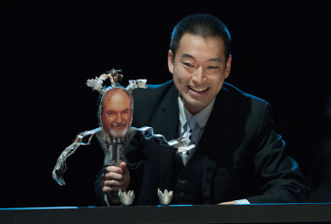
The Act 3 storm scene represents, of course, Winters's finest moments. His Lear blusters as if buffeted - Goneril slamming the gate on him; no explanation for his man Kent being in "the stocks" - and all he can do is roar at his ungrateful daughters - "I gave you all!" - as the 3.2 storm rolls in. Timpani drummers above the stage and atop the stairs pound out booming thunder and stagehands with flashlights - along with bursts from strobe lights - conjure an effectively surreal storm. The Fool embraces Lear - Goneril just rolls her eyes in impatience - before following the King onto the heath. When Winters's Lear storms back to the stage, pun intended, Rauch includes some touchingly humane moments to counter Lear's ravings against mankind. First, Kent uses the sweater off his back to wrap the troubled old King, and Lear, in turn, uses the heavy sweater to protect the trembling Fool. They discover Poor Tom 3.4 not in a cave but in a storm cellar, Edmund leaping from a trap in just his undergarments, and Winters's Lear seems taken by the idea and begins stripping off his own clothes. Finally, the Fool quietly dies in the thundering chaos of the storm, a sad little moment in a corner of the dark old cellar.
Rauch contrasts the latter part of Act 3 against the humanity in the storm cellar, dwelling on the cruelty of the wealthy in the safety of their opulent mansion drawing room. With Gloucester rope-tied sitting within a chair, Regan pours wine and flirts not-so-discretely with Edmund while Scotch-swilling Cornwall tinkers at the piano, playing the melody of "Three Blind Mice." Cornwall tosses the whiskey into Gloucester's face 3.7, and just after a dramatic lightning-strike power outage, plucks out an eye and stomps it onstage. Robin Goodrin Nordli's Regan is not sadistic or scenery-chewing insane, but much more believable - and truly frightening - as a little off and more than a little cruel. She helps her wounded husband fight off a rebellious servant but when Cornwall chugs straight from a whiskey decanter and collapses, reaching out for her, Regan moves away. She puts Gloucester's eyeglasses back on his bleeding face then plucks chunks of wax from candles and flings the lumpen bits to the stage before slipping upstairs in a sleepwalking zombie stroll that recalls her turn as Lady Macbeth in 2009 and signals the second and final intermission. Cornwall's corpse remains onstage as the stage crew re-sets the scene, and when they finally drag the body from the stage by the arms, they receive an appreciative round of applause from the audience.
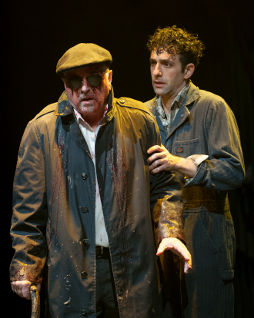
Rauch's storytelling skills are superb: he culls the power and scope of a large-scale tragedy and plays it out quickly and seamlessly on a small space surrounded by audience members. Rauch threads together four story lines from Act 4, all taking place in the now war-ravaged interior mansion, the gate wrecked, the chandelier down, the recliner burnt out, piano and tables and chairs upended, even the throne atop the stairs on its side. Edgar scurries about as the Puck-like Tom, guiding the gory-faced Gloucester from the wreckage - "I stumbled when I saw" - accepting a purse then returning it discreetly to his father's pocket. He leads his father outside to the cliff and to Lear, who only allows Gloucester to kiss his hand - "it smells of mortality" - once he wipes it clean. Rauch intercuts these self-realization scenes with Goneril kissing Edmund 4.2 then leaping into his arms as Oswald looks away in embarrassment, the 4.3 arrival of invading French troops in SWAT-like modern riot gear - helmets, clear visors, body armor - led by trench-coated Cordelia in a kicky black beret, and Regan 4.5 trying to sexually seduce Oswald: "I'll love thee much."
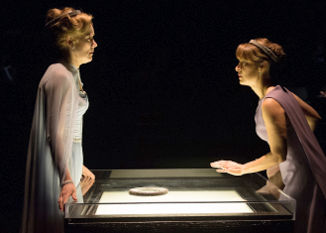
Winters's Lear becomes heartbreakingly aware, confiding 4.7 to the French soldiers, "let me have surgeons; I am cut to the brains" before scurrying away in the opposite direction, and he returns in a filmy white hospital robe within a wheelchair, an intravenous tube dangling between a hanging bottle and his hand. He tells Cordelia "if you have poison, I will drink it" before yanking out his IV tube and walking away. Rauch hits spot lighting around the stage to rapidly show the audience the merging story lines, sometimes with non-textual detail: Oswald pulls a concealed knife from his umbrella 4.7 to threaten Gloucester, but Edgar intervenes and kills Oswald with his own weapon; and 5.1 while Regan slaps Edmund's armored chest and kisses him, Goneril laces her Scotch tumbler with poison.
The conclusion comes quickly and with considerable power. After Lear and Cordelia are returned to the stage in orange jumpsuits as prisoners of war, she succumbs to uncharacteristic tears, and Winters's Lear kisses her cheek fondly. Before the duel between half-brothers - Edgar spins at the last moment to stab Edmund, who collapses and crawls toward the audience - Regan crumples to the stage after vomiting into a handkerchief. Rauch keeps the action fast and furious, layering image upon memorable image. After the duel, Nordli's Regan flees the stage for a suicide with Edmund's combat knife. The dead sisters are returned moments later on a rolling cart, and Kent covers them with a sheet as Winters's Lear drags Cordelia's body - "howl! howl! howl!" - upon a canvas to center stage. After Edmund dies within the front row of the audience, Kent helps Lear gather Cordelia, a noose around her neck and rope burns visible on her throat, within his arms. They all kneel, and after Winters's heartbroken Lear slumps backward, Edgar joins Albany in a praying sign, and Kent whispers "o let him pass" as this up-close-and-personal powerhouse of a tragedy concludes with soldiers standing to salute.